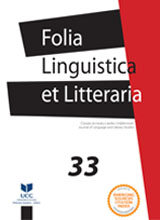SYNTACTIC AND LEXICAL ASPECTS OF STUDENTS’ LEGAL TRANSLATIONS AT THE POSTGRADUATE LEVEL
SYNTACTIC AND LEXICAL ASPECTS OF STUDENTS’ LEGAL TRANSLATIONS AT THE POSTGRADUATE LEVEL
Author(s): Igor LakićSubject(s): Language and Literature Studies, Syntax, Lexis, Translation Studies
Published by: Filološki fakultet, Nikšić
Keywords: teaching legal translation; literal and free translation; syntactic errors; lexical errors
Summary/Abstract: Teaching translation of legal texts into English at the postgraduate level at the Faculty of Philology (formerly at the Institute of Foreign Languages), University of Montenegro, started in 2004. At this study programme, students face for the first time challenges of translating legal texts. Although they occasionally translate some legal texts at the undergraduate level, this is the first time that they study legal translation in a systematic way. This certainly produces some challenges, that may be mainly observed on two levels: (1) syntactic level, where some students produce English sentences that are literal translations of Montenegrin sentences; bearing in mind syntactic differences in the languages, this sometimes leads to a loss of meaning or distorted meaning in translations; and (2) lexical level, where there are differences in the English and Montenegrin legal systems, which certainly requires caution in translation; it is possible to identify some inconsistencies in using legal terminology because some Montenegrin concepts cannot be always simply transferred into English without looking more deeply into the legal systems. The paper discusses the notions of formal fidelity vs. fidelity to the “uniform intent” of the text (Šarčević, 1997) or what Hatim and Munday (2004) refer to as literal and free translation. These notions are crucial for my discussion of causes of errors in my students’ translations.
Journal: Folia Linguistica et Litteraria
- Issue Year: 2020
- Issue No: 33
- Page Range: 189-205
- Page Count: 17
- Language: English

